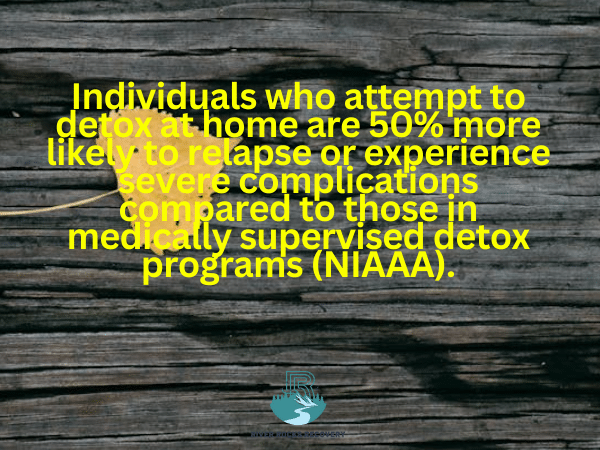Detoxification, or detox, is the first critical step in overcoming alcohol addiction. For individuals struggling with alcohol dependency, detox helps rid the body of alcohol while managing withdrawal symptoms. While the process can be challenging, it is an essential foundation for effective long-term recovery. Understanding the role of detox in alcohol rehab and what to expect during this phase can help you or a loved one take the first step toward sobriety.
In this, we will explore the significance of detoxification in alcohol treatment and how it creates the conditions for recovering completely.
What Is Detox?
Detox is the process by which the body eliminates alcohol and its toxins after prolonged use. During this phase, individuals often experience withdrawal symptoms as the body adjusts to functioning without alcohol.
Why Is Detox Important?
- Physical Stabilization: Detox helps the body return to its natural balance, free of alcohol’s effects.
- Managing Withdrawal Symptoms: Professional detox ensures that withdrawal symptoms are managed safely and effectively.
- Preventing Severe Complications: For those with severe alcohol dependency, withdrawal symptoms can become life-threatening without medical supervision.
What is Detox in Alcohol Rehab?
Detoxification, commonly referred to as detox, is the process of clearing alcohol from the body. For individuals struggling with alcohol dependency, detox is necessary because long-term alcohol abuse alters brain chemistry and bodily functions.
When a person stops drinking suddenly, withdrawal symptoms can arise, ranging from mild discomfort to severe health risks.
A structured detox program within an Addiction Treatment Program provides medical supervision to ensure the safety and comfort of the individual during this critical phase.
The Role of Detox in Alcohol Addiction
- Physical Stabilization
During prolonged alcohol use, the body becomes reliant on the substance. Detox helps to remove toxins while addressing physical dependency. Under professional care, withdrawal symptoms are closely monitored, and medications like benzodiazepines may be administered to reduce risks and discomfort.
- Mental Clarity
Alcohol clouds judgment and decision-making. Detox helps individuals regain mental clarity, which is essential for actively participating in subsequent treatment stages like counseling, therapy, and educational sessions.
- Foundation for Long-term Recovery
Detox is a phase in preparation rather than a stand-alone remedy. Once the body is free of alcohol, individuals can fully engage in structured programs such as a Partial Hospitalization Program or a Sober Living Program to address the psychological and behavioral aspects of addiction.
Alcohol Withdrawal Symptoms
The severity and duration of withdrawal symptoms vary based on factors such as the individual’s level of alcohol use, overall health, and history of addiction.
Common Symptoms
- Nausea and vomiting
- Sweating
- Anxiety
- Insomnia
- Irritability
Severe Symptoms (Delirium Tremens – DTs)
- Severe confusion
- Hallucinations
- Seizures
- Rapid heart rate
- High blood pressure
Types of Detox Approaches
- Inpatient Detox
Inpatient detox involves staying at a specialized facility where medical staff can provide 24/7 care. This approach is often recommended for severe addiction cases or those with co-occurring medical conditions.
- Outpatient Detox
For individuals with milder addictions or strong support systems at home, outpatient detox can be an effective option. It allows patients to continue with daily responsibilities while attending regular medical checkups.
- Medically Assisted Detox
Medications play a significant role in easing withdrawal symptoms and preventing relapse. Common medications include Naltrexone, Acamprosate, and Disulfiram, which help manage cravings and reduce the appeal of alcohol.
The Role of Medically Supervised Detox
Medically supervised detox is critical for managing withdrawal symptoms safely and effectively. Attempting to detox without professional help can be dangerous and, in some cases, fatal.
1. Monitoring and Support
At River Rocks Recovery, our medical staff provides round-the-clock monitoring to address complications as they arise.
- Vital sign checks
- Medication to manage symptoms
- Emotional support and reassurance
2. Medication-Assisted Treatment (MAT)
Medications may be prescribed to ease withdrawal symptoms and reduce cravings. Commonly used medications include:
- Benzodiazepines: To prevent seizures and manage anxiety.
- Naltrexone: To reduce alcohol cravings.
- Acamprosate: To help maintain abstinence.
3. A Safe, Supportive Environment
Professional detox centers create a calm and structured environment, free from triggers or access to alcohol, ensuring a focus on recovery.
Challenges during Detox
- Physical Symptoms: Fatigue, insomnia, headaches, and tremors are common.
- Psychological Symptoms: Anxiety, depression, and mood swings can occur as the body adjusts to the absence of alcohol.
- Risk of Relapse: Without proper support, some individuals may struggle to maintain sobriety during or after detox.
This is why it’s crucial to undergo detox under medical supervision and as part of a larger Alcohol Addiction Treatment Program.
The Importance of Detox in Alcohol Rehab
Detox plays a foundational role in alcohol rehab, setting the stage for long-term recovery.
1. Breaking Physical Dependency
Detox helps individuals overcome the physical dependency on alcohol, allowing them to focus on psychological and emotional recovery.
2. Addressing Health Risks
Chronic alcohol use can lead to serious health problems, such as liver damage and cardiovascular issues. Detox provides an opportunity to address these conditions and begin the healing process.
3. Preparing for Therapy
Detox clears the mind, making individuals more receptive to therapy and other components of rehab programs like Addiction Treatment Program and Mental Health Treatment.

What Comes After Detox?
While detox is a crucial first step, it is not a standalone solution. True recovery requires addressing the underlying issues that contribute to alcohol dependency.
1. Partial Hospitalization Program (PHP)
PHP offers intensive care and therapy during the day, allowing individuals to return home or to a Sober Living Program at night.
2. Intensive Outpatient Program (IOP)
IOP provides flexibility for individuals balancing recovery with work, school, or family responsibilities while continuing therapy and support.
3. Outpatient Program
For those who have completed intensive treatment, outpatient programs offer ongoing support and therapy to maintain sobriety.
4. Sober Living Program
A Sober Living Program provides a structured, alcohol-free environment that supports long-term recovery.
Why Choose an Addiction Treatment Center in Ohio?
Ohio is home to numerous reputable addiction treatment centers offering comprehensive care. These facilities provide a range of services, from detox and inpatient treatment to outpatient therapy and aftercare.
Their holistic approach ensures that individuals receive the medical, emotional, and psychological support needed for a successful recovery.
How River Rocks Recovery Can Help
At River Rocks Recovery, we offer a full continuum of care to support individuals through every stage of recovery:
- Alcohol Addiction Treatment Program: Comprehensive care for alcohol dependency.
- Partial Hospitalization Program (PHP): Intensive care with a structured schedule.
- Intensive Outpatient Program (IOP): Flexible treatment for those transitioning from higher levels of care.
- Outpatient Program: Continued therapy and support for long-term recovery.
- Sober Living Program: A safe, supportive environment to maintain sobriety.
River Rocks Recovery: Your Path to Revamp Sobriety in Life!
Are you ready to revamp sobriety in life? Yes! At River Rocks Recovery, we understand that recovery is a personal journey. Our state-of-the-art facilities and evidence-based treatment programs, including detox, partial hospitalization, and sober living, are designed to empower individuals to reclaim their lives.
Detox is a critical step in the journey to recovery from alcohol addiction. While the process can be challenging, it provides a necessary foundation for addressing the physical and psychological aspects of addiction. At River Rocks Recovery, we are dedicated to providing safe, effective detox and comprehensive care to support individuals at every stage of their recovery journey.
Call us today at (888) 905-6281 to learn more about our programs and take the first step toward a healthier, alcohol-free life.
FAQ for Role of Detox in Alcohol Rehab
What is detox in alcohol rehab?
Detox is the process of eliminating alcohol from the body while managing withdrawal symptoms. It is the first step in recovery and prepares individuals for further treatment.
Why is medically supervised detox important?
Medically supervised detox ensures safety by managing withdrawal symptoms, preventing complications, and addressing health risks like seizures or delirium tremens (DTs).
What are the common withdrawal symptoms during alcohol detox?
Symptoms include nausea, sweating, anxiety, insomnia, irritability, and in severe cases, hallucinations, seizures, or confusion.
How long does alcohol detox take?
The detox process typically lasts 3-7 days, but the exact duration varies based on the individual’s level of alcohol use and overall health.
What happens after detox?
After detox, individuals transition into treatment programs like Partial Hospitalization Program (PHP), Intensive Outpatient Program (IOP), or Sober Living Program to address the psychological and emotional aspects of addiction.




























